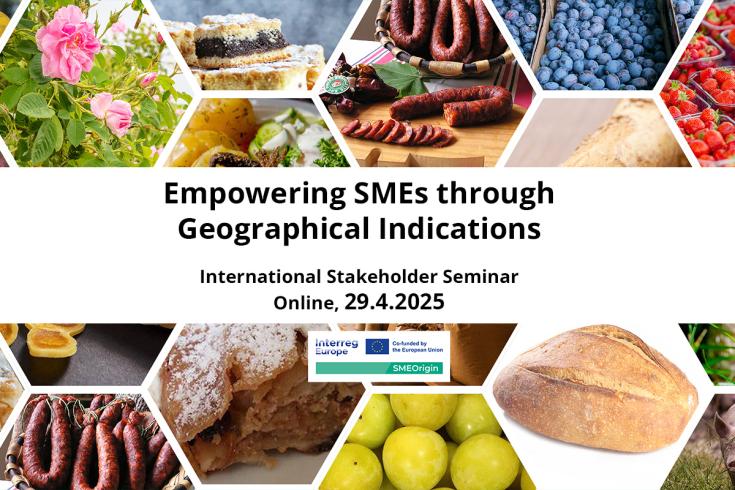Empowering SMEs through Geographical Indications: Key points
The 5th Online Stakeholder Event of the SMEOrigin project convened over 30 participants from across Europe for a focused and practical exchange on how Geographical Indications (GIs) can empower small and medium-sized enterprises (SMEs), reinforce local identities, and promote sustainable regional development.
Keynote Address: GI Protection as a Pillar for Rural Growth
The event was opened by Virginia Bustos, Policy Officer at the European Commission’s DG AGRI, who emphasized that GIs are not just labels, but strategic tools for sustainable economic growth, rural resilience, and cultural heritage preservation.
She also introduced the key features of the new Regulation (EU) 2024/1143, in force from early 2025, which marks a turning point in how the EU protects, governs, and promotes GIs.
The Economic Significance of GIs
-
Total sales value of EU GIs: ~€75 billion (2017)
-
6.8% of all EU food and drink sales
-
€17 billion in exports to non-EU countries
-
GI-labelled products sell at an average 2.11× premium over similar non-GI products
Regulation (EU) 2024/1143: A New Era of GI Governance
The revised GI regulation introduces several landmark features designed to enhance protection, transparency, and sustainability across the GI landscape:
1. Online Protection Under the Digital Services Act
-
GIs are now safeguarded against online misuse, including imitation and deceptive use on e-commerce platforms.
-
Any such content is classified as illegal under the Digital Services Act (DSA).
-
National authorities can demand removal or blocking of infringing materials.
2. Clearer Rules for Processed Products
-
GIs can only be referenced in the names of processed products if:
-
No comparable substitute ingredient is used,
-
The GI ingredient is used in sufficient quantity to confer essential character,
-
The percentage of the GI is indicated on the label.
-
-
Prepacked food producers must notify Recognised Producer Groups (RPGs) of GI use.
3. Optional Sustainability Features
-
Producers may now voluntarily include sustainability commitments in product specifications.
-
Themes include: climate action, biodiversity, pesticide reduction, animal welfare, and employment preservation.
-
-
The Commission will publish annual sustainability reports based on adoption rates.
4. Transparent Labeling Obligations
-
From May 2026, food and spirit products bearing GIs must display the producer’s name prominently on the label.
-
The use of GI logos remains mandatory for food products; optional for wines and spirits.
5. Recognised Producer Groups (RPGs)
-
New governance model introduced at national level:
-
RPGs coordinate user compliance,
-
Manage producer notifications,
-
Support enforcement and market transparency.
-
Local Actions, Global Lessons: Good Practices Shared
Several innovative regional projects were presented, offering transferable insights into how GIs can drive inclusive and sustainable development.
Opolskie with Taste (Poland)
Marcin Staniszewski showcased a regional branding initiative that:
-
Supports 120 certified products and 85 local producers,
-
Highlights PGIs such as Kołocz Śląski and Krupnioki Śląskie,
-
Actively engages NGOs, women, and youth to revive rural culinary traditions.
Avgustiada Festival & Local Green Deals (Bulgaria)
Maria Andreeva (SZ REDA) presented a decade-long festival combining:
-
Wine and food SME promotion with cultural heritage,
-
A public-private partnership model,
-
Local Green Deals to co-promote sustainable food and tourism initiatives
Value Chain Analysis & Funders’ Club (France)
Julie Roussel introduced:
-
Value Chain Analysis as a tool to define fair pricing across the GI supply chain,
-
The Funders’ Club, linking SMEs with over €30 million in public and private financing opportunities.
ArrozInnova Calasparra (Spain)
Sergio López detailed how this Operational Group:
-
Uses EU and regional funds to digitize PDO rice production,
-
Strengthens sustainability and market competitiveness.
Oinoxeneia Quality Network (Greece)
Dr. Konstantinos Antonopoulos highlighted:
-
PGI wine promotion through the Oinoxeneia festival,
-
Integration of gastronomy, tourism, and culture to stimulate regional development.
South Savo Initiatives (Finland)
Two practices stood out:
-
Kerimäki Fish House: Uses the PGI label for vendace, supporting up to 40 seasonal jobs and €2 million turnover.
-
South Savo Food Cluster: Boosts cross-border SME collaboration via the European Cluster Collaboration Platform.
Closing Reflections
The event concluded with a reaffirmed commitment among SMEOrigin partners to:
-
Strengthen SME competitiveness through place-based branding,
-
Align GI strategies with the green and digital transitions,
-
Foster policy learning and practice transfer through the newly launched SMEOrigin Exchange Platform.

